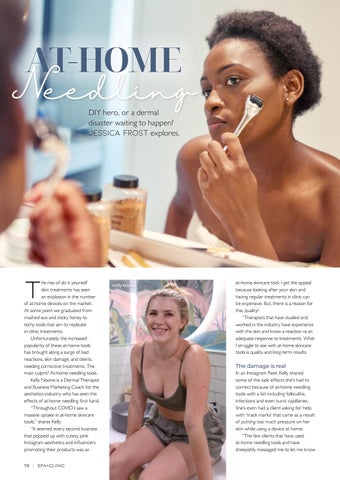heading
AT-HOME
Needling DIY hero, or a dermal disaster waiting to happen? Jessica Frost explores.
T
he rise of do it yourself skin treatments has seen an explosion in the number of at-home devices on the market. At some point we graduated from mashed avo and sticky honey to techy tools that aim to replicate in-clinic treatments. Unfortunately, the increased popularity of these at-home tools has brought along a surge of bad reactions, skin damage, and clients needing corrective treatments. The main culprit? At-home needling tools. Kelly Noone is a Dermal Therapist and Business Marketing Coach for the aesthetics industry who has seen the effects of at-home needling first hand. “Throughout COVID I saw a massive uptake in at-home skincare tools,” shares Kelly. “It seemed every second business that popped up with cutesy pink Instagram aesthetics and influencers promoting their products was an 98 | SPA+CLINIC
Kelly Noone
at-home skincare tool. I get the appeal because looking after your skin and having regular treatments in clinic can be expensive. But, there is a reason for this; quality! “Therapists that have studied and worked in the industry have experience with the skin and know a reaction vs an adequate response to treatments. What I struggle to see with at-home skincare tools is quality and long-term results.
The damage is real In an Instagram Reel, Kelly shared some of the side effects she’s had to correct because of at-home needling tools with a list including folliculitis, infections and even burst capillaries. She’s even had a client asking for help with ‘track marks’ that came as a result of putting too much pressure on her skin while using a device at home. “The few clients that have used at-home needling tools and have sheepishly messaged me to let me know
